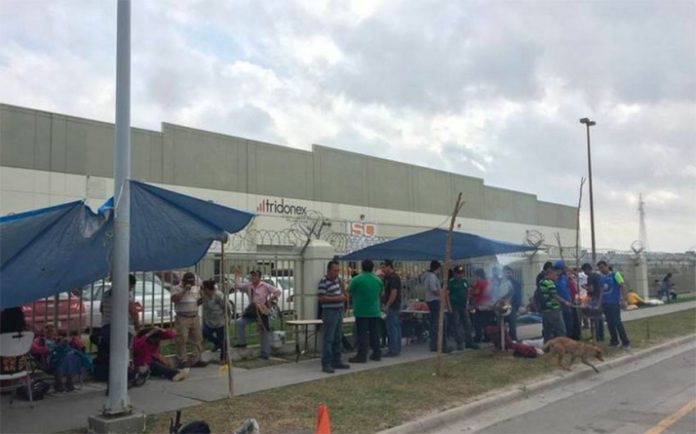The new North American free trade agreement is supposed to guarantee workers’ right to choose the union they want to represent them.
But some workers at an auto sector factory in Matamoros, Tamaulipas, have found that freeing themselves of the shackles of their current union is no easy feat.
After their union, SITPME, didn’t support their fight for higher wages in 2019, a significant number of workers at the Tridonex auto-parts plant decided that they wanted to be represented by a new organization led by Susana Prieto, an activist and attorney.
According to the news agency Reuters, about 400 Tridonex reporters protested outside a labor court in Matamoros last year to be allowed to change unions. The United States-Mexico-Canada Agreement (USMCA), which took effect last July, enshrines workers’ rights to choose which union manages their collective contract.
But the Tridonex workers who no longer want to be represented by SITPME haven’t managed to switch to Prieto’s union, although their employer earlier this year consented to their decision to stop paying dues to the former.
“Dismantling the power of Mexico’s entrenched unions is proving a tough challenge,” Reuters said, quoting labor activists.
“… Amid resistance from SITPME, the Tridonex workers’ request to be represented by Prieto’s union has still not been put to a vote,” the news agency said.
It added that legal challenges by Prieto to replace the unions at 45 other factories in the Matamoros area have “stalled.”
According to Prieto, many Tridonex workers who wanted to leave SITPME are no longer employed at the Matamoros factory, where second-hand car parts are refitted for sale in the United States and Canada. She told Reuters that 600 of her supporters were dismissed between April and October of 2020.
The news agency said it could not independently verify the claim, although it did confirm that more than 700 Tridomex workers were fired in that period last year.
It noted that Cardone Industries, the Philadelphia-based parent company of Tridonex, didn’t respond to a question about whether the termination of the workers was retaliation for their opposition to SITPME. However, Cardone did say that there were layoffs due to decreased demand associated with pandemic lockdowns.
SITPME’s longtime leader Jesús Mendoza said that workers’ claims that they were dismissed as retaliation were “lies.”
Reuters reported that some of the Matamoros workers who were unable to switch to Prieto’s union are now looking to the United States for support.
There is speculation that U.S. President Joe Biden will pressure Mexico to ensure that workers’s rights as set out in the USMCA are respected. The three-way pact, which replaced NAFTA, stipulates that companies that don’t allow workers to freely choose their union representation can be punished with tariffs or other penalties.
United States Trade Representative Katherine Tai said last week that she was not afraid to use USMCA enforcement provisions but didn’t specify which issues could be reviewed by the office she heads.
In the meantime, Mexican workers in Matamoros and elsewhere who push to be represented by the union of their choice will likely continue to face the prospect of dismissal, as has occurred with many employees who have tried to stand up for their labor rights.
“They fire them; they suppress them. They stop giving extra hours. They don’t give bonuses. They change them to night shift,” said Federal Center of Conciliation and Labor Registration chief Alfredo Dominguez, referring to punishments routinely dished out to agitators by Mexican companies.
SITPME, meanwhile, told Reuters that it had won back the support of at least 3,000 people who had wanted to join Prieto’s breakaway union. Mendoza defended the union’s record, saying it has delivered benefits for its members while maintaining good relations with the companies that employ them.
The union leader also said that his modus operandi is to seek dialogue with company executives to resolve labor issues rather than call for strikes.
“What we do well is guarantee labor peace and efficiency in the workforce,” Mendoza said.
Source: Reuters (en)
